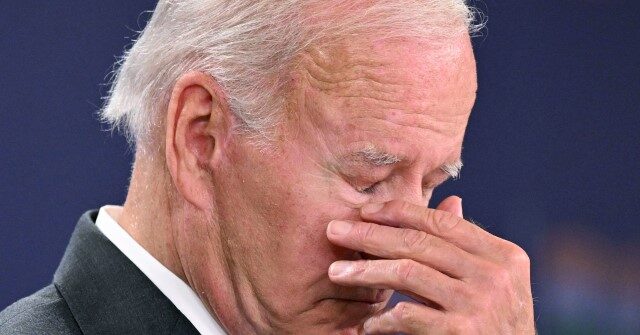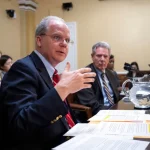

The U.S. State Department on Tuesday walked back remarks questioning Pakistan’s ability to keep its nuclear weapons safe by leftist President Joe Biden, who went as far as to call the South Asian nation, a nominal ally of America’s, “one of the most dangerous nations in the world.”
Biden made the offending comments at a Democrat Party event at a private home in California last week.
Offering disorganized remarks commenting on nuclear weapons generally, Biden mentioned Pakistan amid boasting yet again that he has a close personal relationship with dictator Xi Jinping of China.
“I’ve spent more time with Xi Jinping than any person in — any head of state in Amer- — in the world,” Biden rambled, again making the dubious claim that he had traveled 17,000 miles with the genocidal leader, which earned him three out four “Pinocchios” from the Washington Post last year.
Biden then abruptly turned to Pakistan.
“This is a guy [Xi] who understands what he wants but has an enormous, enormous array of problems. How do we handle that?” the president asked. “How do we handle that relative to what’s going on in Russia? And what I think is maybe one of the most dangerous nations in the world: Pakistan. Nuclear weapons without any cohesion.”
“So, folks, there’s a lot going on. A lot going on,” he continued, never returning to elaborate on his opinion of Pakistan.
As reported by the Pakistani newspaper Dawn on Saturday, an official press release from the office of Pakistan’s Prime Minister’s office described President Biden’s words as “factually incorrect and misleading,” demanding that “unnecessary comments” should be avoided.
Following the publication of the event’s official transcript, Pakistan’s Foreign Affairs Ministry immediately summoned the U.S. Ambassador to Islamabad Donal Blome and requested the ambassador deliver a demarche on President Biden’s comments.
“Pakistan’s disappointment and concern was conveyed to the US envoy on the unwarranted remarks, which were not based on ground reality or facts,” the Foreign Affairs Ministry’s press release read.
Principal Deputy Spokesperson of the U.S. Department of State Vendal Patel addressed the growing scandal on Tuesday, telling reporters, “the United States is confident of Pakistan’s commitment and its ability to secure nuclear assets.”
“The U.S. has always viewed a secure and prosperous Pakistan as critical to U.S. interests. And more broadly, the U.S. values our longstanding cooperation with Pakistan,” Patel added.
By the time the State Department intervened to diminish the outrage, most high-profile Pakistani political leaders had weighed in to condemn Biden. Pakistan’s Foreign Affairs Minister Bilawal Bhutto Zardari told reporters on Saturday that he was surprised by President Biden’s comments, noting that Biden’s concerns over Pakistan’s nuclear weapon safety had not been raised by U.S. officials to him during his recent visit to the United States in September — when U.S. Secretary of Defense Anthony Blinken defended the sale of U.S. weapons to Pakistan.
The Islamic nation’s Prime Minister Shehbaz Sharif responded to Biden’s comments through his Twitter account on Saturday with a post that read, “Pakistan is a responsible nuclear state and we are proud that our nuclear assets have the best safeguards as per IAEA requirements.”
“We take these safety measures with the utmost seriousness. Let no one have any doubts,” he asserted.
Nawaz Sharif, the prime minister’s brother and himself a former prime minister, also responded to Biden’s comments, writing, “our nuclear program is in no way a threat to any country.”
Pakistan is a responsible nuclear state that is perfectly capable of safeguarding its national interest whilst respecting international law and practices. Our nuclear program is in no way a threat to any country. Like all independent states,
…1/2
— Nawaz Sharif (@NawazSharifMNS) October 15, 2022
Imran Khan, who served as Pakistan’s prime minister between the terms of the Sharif brothers, reacted to Biden’s comments by stating that Biden’s words showed a “total failure of the imported government’s foreign policy and its claims of a reset of relations with the U.S.”
Khan’s tenure in office — marked by thousands-strong Muslim mobs repeatedly rioting in response to alleged slights to sharia, or the Islamic law — largely served to highlight the instability in the country that prompted Biden’s comments. Khan himself is an avowed Islamist who has reverently referred to al-Qaeda terrorist Osama bin Laden as a “martyr” and demanded global anti-blasphemy laws overriding state sovereignty to protect Muslims from “Islamophobia.”
Pakistan’s longstanding geopolitical rivalry with neighboring India is also cause for alarm. Both nations possess nuclear weapons and share more than seven decades of historical tensions, often erupting into violence in the disputed Kashmir region. India currently controls and claims Jammu and Kashmir as its sovereign territory. Pakistan considers the territories “occupied” by India, going as far as to express its intention of conquering the disputed lands.
The disputed region is home to constant attacks and skirmishes between Indian and Pakistani forces, with 2018 being considered the deadliest year for the region for having over 500 registered casualties. On Tuesday, two Indian laborers were killed in a grenade attack that Indian police have deemed a “hybrid terrorist” attack carried out by militants fighting Indian rule of the Kashmir region. India considers the Kashmir rebel militias as Pakistan-sponsored terrorism.
The two countries’ distaste for each other’s governments has spilled over into seemingly unrelated forums, most recently during a debate this month at the United Nations regarding Russia’s invasion of Ukraine. During the debate, the Pakistani representative used his time to condemn India’s policy in Kashmir, prompting a rebuke from the Indian ambassador and derailing the conversation about Ukraine.
Christian K. Caruzo is a Venezuelan writer and documents life under socialism. You can follow him on Twitter here.





